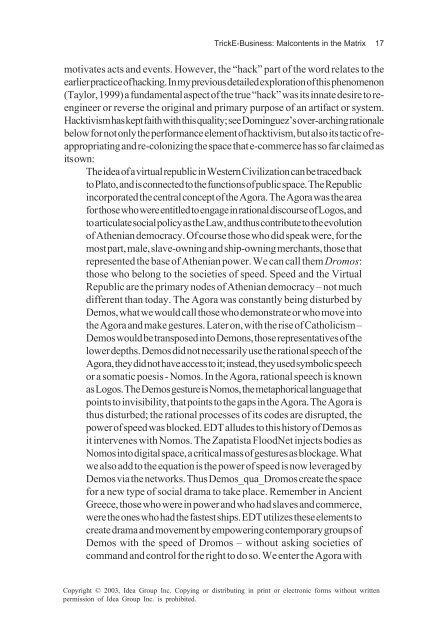www.sharexxx.net - free books & magazines
www.sharexxx.net - free books & magazines
www.sharexxx.net - free books & magazines
Create successful ePaper yourself
Turn your PDF publications into a flip-book with our unique Google optimized e-Paper software.
TrickE-Business: Malcontents in the Matrix 17<br />
motivates acts and events. However, the “hack” part of the word relates to the<br />
earlier practice of hacking. In my previous detailed exploration of this phenomenon<br />
(Taylor, 1999) a fundamental aspect of the true “hack” was its innate desire to reengineer<br />
or reverse the original and primary purpose of an artifact or system.<br />
Hacktivism has kept faith with this quality; see Dominguez’s over-arching rationale<br />
below for not only the performance element of hacktivism, but also its tactic of reappropriating<br />
and re-colonizing the space that e-commerce has so far claimed as<br />
its own:<br />
The idea of a virtual republic in Western Civilization can be traced back<br />
to Plato, and is connected to the functions of public space. The Republic<br />
incorporated the central concept of the Agora. The Agora was the area<br />
for those who were entitled to engage in rational discourse of Logos, and<br />
to articulate social policy as the Law, and thus contribute to the evolution<br />
of Athenian democracy. Of course those who did speak were, for the<br />
most part, male, slave-owning and ship-owning merchants, those that<br />
represented the base of Athenian power. We can call them Dromos:<br />
those who belong to the societies of speed. Speed and the Virtual<br />
Republic are the primary nodes of Athenian democracy – not much<br />
different than today. The Agora was constantly being disturbed by<br />
Demos, what we would call those who demonstrate or who move into<br />
the Agora and make gestures. Later on, with the rise of Catholicism –<br />
Demos would be transposed into Demons, those representatives of the<br />
lower depths. Demos did not necessarily use the rational speech of the<br />
Agora, they did not have access to it; instead, they used symbolic speech<br />
or a somatic poesis - Nomos. In the Agora, rational speech is known<br />
as Logos. The Demos gesture is Nomos, the metaphorical language that<br />
points to invisibility, that points to the gaps in the Agora. The Agora is<br />
thus disturbed; the rational processes of its codes are disrupted, the<br />
power of speed was blocked. EDT alludes to this history of Demos as<br />
it intervenes with Nomos. The Zapatista FloodNet injects bodies as<br />
Nomos into digital space, a critical mass of gestures as blockage. What<br />
we also add to the equation is the power of speed is now leveraged by<br />
Demos via the <strong>net</strong>works. Thus Demos_qua_Dromos create the space<br />
for a new type of social drama to take place. Remember in Ancient<br />
Greece, those who were in power and who had slaves and commerce,<br />
were the ones who had the fastest ships. EDT utilizes these elements to<br />
create drama and movement by empowering contemporary groups of<br />
Demos with the speed of Dromos – without asking societies of<br />
command and control for the right to do so. We enter the Agora with<br />
Copyright © 2003, Idea Group Inc. Copying or distributing in print or electronic forms without written<br />
permission of Idea Group Inc. is prohibited.









